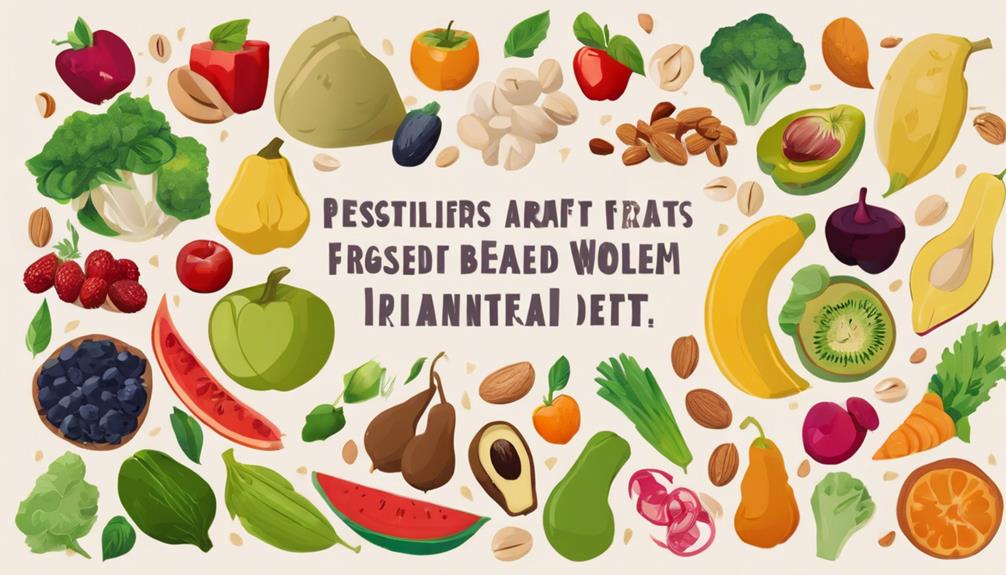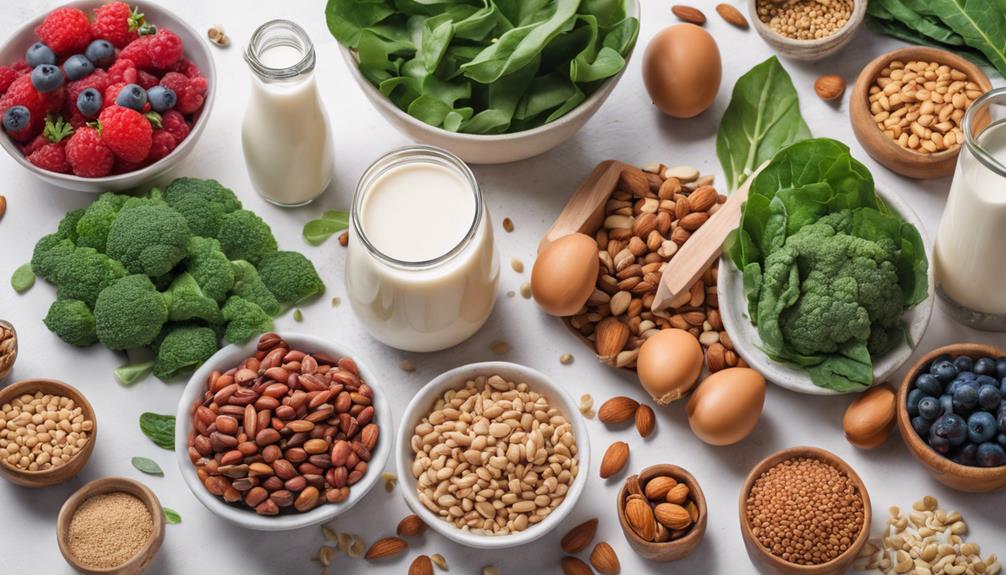How to Make the Switch to a Plant-Based Diet for Women’s Health
If you've been considering a shift towards a plant-based diet for women's health, you're not alone in recognizing the potential benefits it can offer. Making this transition can be a pivotal step towards enhancing your overall well-being and hormonal balance. However, embarking on this journey requires more than just swapping ingredients; it involves a thoughtful approach to meal planning, understanding essential nutrients, and navigating potential challenges that may arise. By exploring the nuances of transitioning to a plant-based diet specifically tailored to women's health, you can pave the way for a transformative lifestyle change that prioritizes your health and vitality.
Benefits of a Plant-Based Diet
Switching to a plant-based diet can offer numerous benefits for women's health. When it comes to hormone balance and menstrual health, the foods you eat play a crucial role. A plant-based diet rich in fruits, vegetables, whole grains, nuts, and seeds can help support hormone balance by providing essential nutrients and phytochemicals that aid in regulating hormonal levels. This balance is key to a healthy menstrual cycle and overall well-being.
Studies have shown that consuming a plant-based diet may reduce the risk of hormone-related conditions such as polycystic ovary syndrome (PCOS) and endometriosis. These conditions can impact menstrual health and fertility, making it essential to focus on foods that promote hormone equilibrium.
Planning Your Plant-Based Meals
Transitioning to a plant-based diet involves thoughtful planning to ensure you're meeting your nutritional needs while enjoying a variety of delicious and satisfying meals. Here are some practical tips to help you plan your plant-based meals effectively:
- Meal Prep: Dedicate some time each week to meal prep. Chop vegetables, cook grains, and prepare some plant-based protein sources in advance. This will save you time during busy days and make it easier to put together nutritious meals.
- Recipe Ideas: Explore different plant-based recipes to keep your meals exciting and diverse. Look for inspiration in cookbooks, online blogs, or recipe apps. Trying out new dishes will prevent mealtime monotony and introduce you to a wide range of flavors.
- Balanced Plates: Aim for balanced meals that include a variety of fruits, vegetables, whole grains, legumes, nuts, and seeds. Incorporating different food groups ensures you're getting a wide array of essential nutrients in your diet.
Essential Nutrients for Women
To maintain optimal health, women need to pay close attention to obtaining essential nutrients that support their well-being. When transitioning to a plant-based diet, it's crucial to ensure you're getting key nutrients that play a vital role in hormone balance and bone health.
Hormone balance is essential for overall well-being, and certain nutrients can support this delicate equilibrium. Incorporating foods rich in omega-3 fatty acids, such as flaxseeds, chia seeds, and walnuts, can help support hormonal health. Additionally, consuming a variety of colorful fruits and vegetables provides phytonutrients that can aid in hormone regulation.
Bone health is another crucial aspect to consider, especially for women who are more prone to osteoporosis. Calcium, vitamin D, and vitamin K are essential for maintaining strong bones. Plant-based sources of calcium include leafy greens, almonds, and fortified plant milks. Sun exposure is a great way to get vitamin D, while vitamin K can be found in foods like kale, broccoli, and Brussels sprouts. Prioritizing these nutrients will help support your hormone balance and bone health on a plant-based diet.
Tips for Transitioning Smoothly
For a seamless shift towards a plant-based diet, it's essential to approach the transition thoughtfully and strategically. Making the change doesn't have to be overwhelming; with the right guidance, you can navigate this transition smoothly. Here are some tips to help you on your journey:
- Meal prep: Dedicate some time each week to plan and prepare your meals. Having plant-based meals ready to go will make it easier to stick to your new eating habits, especially on busy days.
- Explore recipe ideas: Experiment with different plant-based recipes to keep your meals exciting and varied. Look for inspiration from cookbooks, online resources, or cooking shows. Trying new dishes can help you discover delicious alternatives to your favorite non-plant-based meals.
- Stay open-minded: Embracing a plant-based diet is a journey, and it's okay to take your time adjusting. Be open to trying new foods and flavors, and don't be too hard on yourself if you slip up occasionally. Remember, progress is more important than perfection.
Maintaining Women's Health on Plant-Based Diet
Making sure your body receives the necessary nutrients while following a plant-based diet is key to maintaining optimal health as a woman.
When it comes to hormonal balance and menstrual health, plant-based diets can offer significant benefits. Foods like flaxseeds, soy products, and leafy greens contain phytoestrogens that may help regulate estrogen levels and support hormonal balance. Additionally, incorporating foods rich in iron, such as lentils and quinoa, can help prevent anemia and support healthy menstrual cycles.
To maintain hormonal balance on a plant-based diet, focus on consuming a variety of whole foods to ensure you're getting essential nutrients like omega-3 fatty acids, vitamin B12, and zinc. These nutrients play crucial roles in hormone production and overall health. Monitoring your intake of these nutrients through fortified foods or supplements can help support your hormonal health while following a plant-based diet.
Frequently Asked Questions
Can I Still Meet My Protein Needs on a Plant-Based Diet?
Yes, you can meet your protein needs on a plant-based diet. Protein sources like legumes, tofu, and quinoa offer ample protein. Supplements like pea protein powder can also help. Nutrient absorption is efficient, leading to various health benefits.
How Can I Manage Cravings for Non-Plant-Based Foods?
Feeling strong cravings for non-plant-based foods is normal. Practice mindful eating by savoring each bite of your plant-based meals. When cravings strike, substitute with healthier options like fruit or nuts. You've got this!
Are There Any Specific Plant-Based Foods to Avoid for Women?
Avoid processed vegan foods high in added sugars, unhealthy fats, and artificial ingredients. Ensure adequate intake of iron, calcium, vitamin D, omega-3 fatty acids for hormonal balance. Focus on whole plant foods for optimal nutrient absorption and overall women's health.
Can I Lose Weight on a Plant-Based Diet Without Counting Calories?
You can lose weight on a plant-based diet without calorie counting by focusing on healthy fats and balanced meals. Nuts, seeds, avocados offer satisfying fats. Fill your plate with colorful veggies, whole grains, legumes for nutrients and satiety.
How Can I Ensure I Am Getting Enough Iron on a Plant-Based Diet?
To ensure you get enough iron on a plant-based diet, focus on iron-rich foods like lentils, beans, tofu, quinoa, and fortified cereals. Consider taking supplements if needed. Pairing these with vitamin C-rich foods enhances iron absorption.
Conclusion
In conclusion, remember that Rome wasn't built in a day. Slow and steady wins the race when transitioning to a plant-based diet for women's health. Embrace the journey, savor the flavors, and nourish your body with phytoestrogen-rich foods and essential nutrients. As the saying goes, "A journey of a thousand miles begins with a single step." Start small, stay consistent, and watch your health bloom on a plant-based path.












